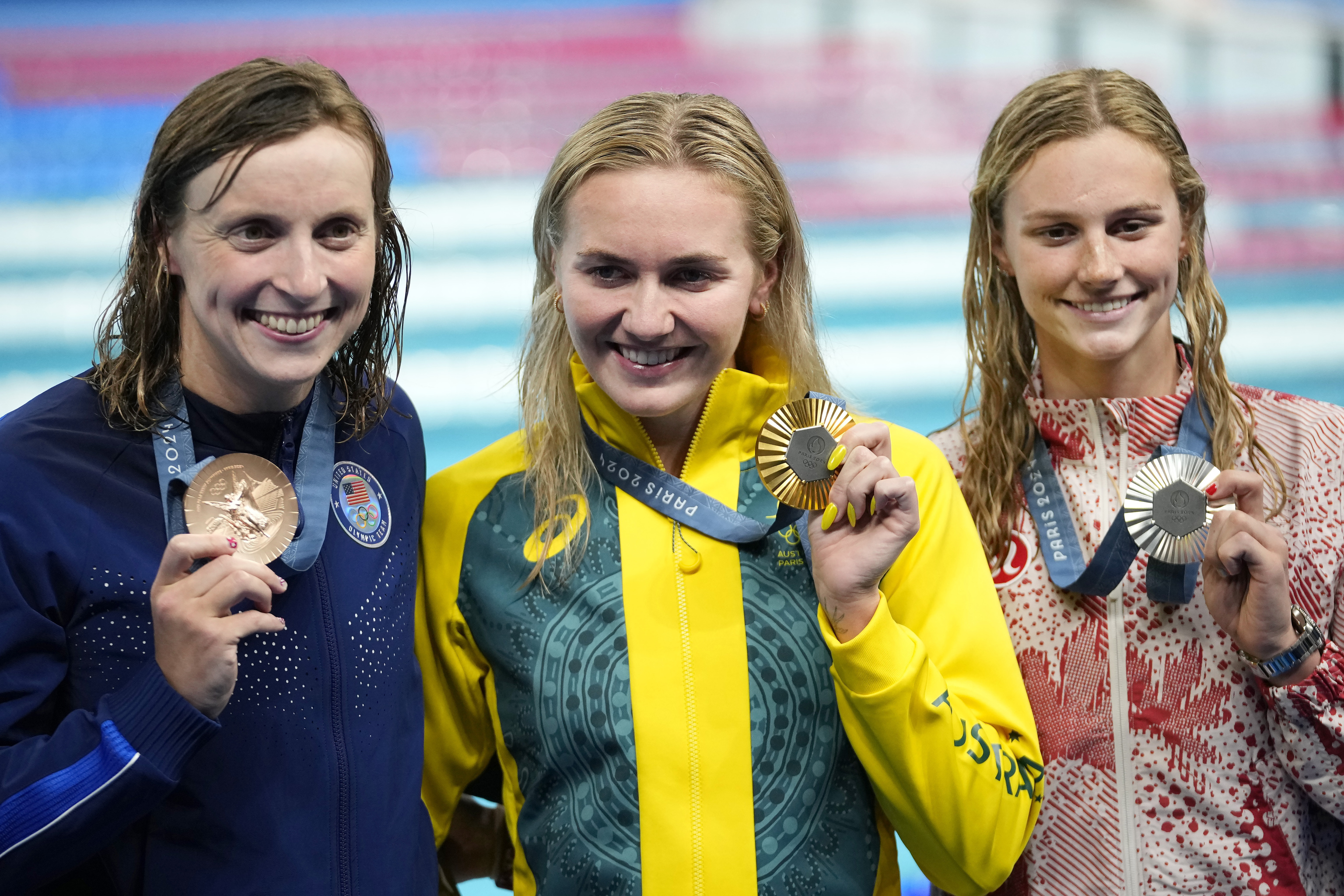When Katie Ledecky first entered La Défense Arena, she said that the pool built in a facility where rugby is usually played made her feel small, tiny. But when she left that same pool after the 400 free final, she did not feel small. She felt human, human again, facing the power of a swimmer who moves like an outboard motor. It's Ariarne Titmus, whom her teammates started calling 'Terminator'. The reason is evident. The Australian knew very early, in the first hundred meters, that she would not need the most terrible part of her nickname, not this time, because Ledecky was not the Ledecky we know, and because Summer McIntosh still has too much respect for hierarchy. These three swimmers, past, present, and future of the event, had everything to take the final to the brink of the world record, held by Titmus. That would have required an inhuman Ledecky. The first encounter with Paris reveals her closer to mortals, but with a great work still ahead.
The American could fear defeat. It was within her calculations. In fact, she already experienced it in Tokyo or in Fukuoka against the same swimmer, the leader of the Australian team who devoured the Japanese pool and has started in the same way in Paris, where she also won the 4x100 free relay on the first day. Ledecky swam in Tokyo in 3:57.36, faster than the winner in Paris (3.57.49). Even if she had repeated it, it would not have mattered, because Titmus would have surpassed her. Her superiority was unquestionable from start to finish. The American, on the other hand, went below the four-minute mark (4.00.86), something she had not done in major competitions practically since she broke that barrier and took the record from Federica Pellegrini. It was the changing of the guard.
This below-par performance, not only due to the bronze, may raise questions about the challenge the American has set for herself. At 27, she aims to also swim the 800, 1,500, and the 4x200 relay. As the distance increases, so does her dominance, as she is basically a distance swimmer. The Ledecky of the past, since her appearance at 15 on the top of the podium in London 2012, has no opposition in the longer events. In Paris, she maintains her goal of becoming the athlete with the most Olympic titles, not just the swimmer. In World Championships, she already has 16, one more than Michael Phelps.
The bronze in the 400 free is her 11th Olympic medal, of which seven are gold. If she can add those from the 800, 1,500, and 4x200, she would reach 10 and surpass the nine of the former Soviet gymnast Larissa Latynina. The Washington DC swimmer's desire, although currently training in Florida, is to reach the 2028 Los Angeles Games, where she will be 31. Until then, she will continue with Anthony Nesty, her coach and the first black swimmer to win gold in the Olympic pool, in Seoul '88. It is not a common age in swimming, especially for such precocious specialists, but Ledecky has managed to professionalize her activity, create her persona, and make a fortune. She has built a career tailored to her, including a biography, based on a very strong personality, far from the weakness that has affected other champions outside the water, like Phelps or Caeleb Dressel. If anyone is capable of recovering from a defeat like the one suffered in Paris, it is precisely Ledecky, not only because of the faith she professes.
To the imposing La Défense pool, she emerged like a star, with short steps, allowing time for the crowd to acclaim her. She is discreet and maintains her routines, but does not dismiss her diva moments. She has earned it. Titmus and McIntosh did it like the others. The American approached the Australian to tell her she had chosen the wrong lane and bucket to leave her things before diving into the water. She had to pick them up. Before climbing onto the starting blocks, no one wanted to look at her. Titmus, despite knowing she was superior, turned her back. That respect is earned over time. That's why the Australian did not want her in front in the pool. She dove in to dispel any doubts from the first 50 meters.
The Los Angeles 2028 frontier
Titmus was 20 when she beat Ledecky in Tokyo. She did it again on more than one occasion. At the Fukuoka World Championships last year, she did it with a new world record (3.55.38), a treasure that the three swimmers who stepped onto the Paris podium have alternated, including the young MacIntosh, who will turn 18 on August 18, days after the Games close. The future duel will be with Titmus, so Ledecky would do well to focus her career on distance, especially with the Los Angeles frontier ahead.
Longevity is more forgiving with distance than with speed. Despite this, Ledecky had managed to be the fastest in the 200 free at her country's trials, but she knew that did not make her a gold medal contender in the event, which Titmus will likely dominate again. They will meet again in the 4x200 relay. A thrilling duel and not an easy one for Ledecky and her teammates, who on the first day already saw the Australians dominate the 4x100 free and relegate them to the second step of the podium.
